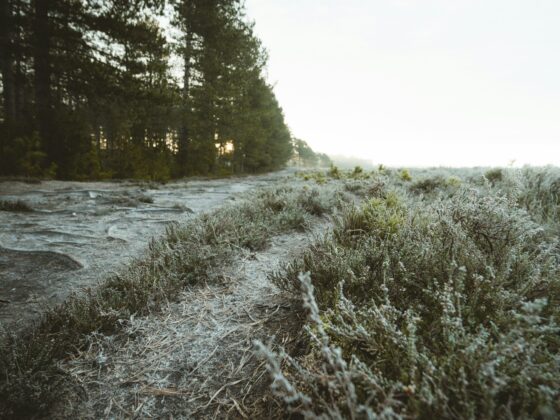by Maya Carni
Third Place – Stories for Survival Writing Competition 2024
“Who hasn’t sat on a train and wondered about the passengers around us? This is a really sympathetic, perceptive exploration of a moment we will all recognise – and a reminder to all of us that we are not the only ones with complicated inner worlds. Who knew that even had a name?” Jeremy Lazell, Head Judge
Sonder—the realization that every random passerby is living a life as vivid and complex as your own. I remain the constant, the main character in my story, and as my life moves on, the people I meet slip away, their backstories lost to me, wrapped in clouds I will never see unfold.
I stare out the train window. Two boys sit on a wall, watching the trains pass through their small town. I wave. They laugh and wave back. And then, the train moves on. I watch them until they fade from view, their lives trailing behind in a blur of landscapes. Sonder-I wonder what their names are.
At the next stop, my first companion boards. He throws his bag overhead, removes his jacket, and places it beside him. Across from me, he pulls a book from his briefcase. Our interaction lasts no longer than a fleeting glance as he notices me watching him. Sonder-Is he traveling for work? Does he take this train every day, and today, by chance, we’ve ended up in the same carriage? Is he on his way home to a family that loves him?
The sun is setting, casting a warm glow over the hills and houses rushing past. He doesn’t look up once, engrossed in his book, as if the landscape outside means nothing to him. Maybe it doesn’t—perhaps he sees it every day, and to him this simply is just land and trees. He stays for only one stop, but marks his existence on this carriage, leaving behind the receipt he used as a bookmark. I watch him step off, disappearing into the station. We’ve shared a brief moment in time, and yet we will never cross paths again. I wonder if, like me, he’ll ever recall this quiet exchange of presence.
I fall asleep, the motion of the train lulling me into dreams. When I wake, the sky is dark, punctuated with stars. Rain starts to fall, droplets tracing patterns on the window. The train plunges into a tunnel, and the change in pressure creates an instant discomfort. Alone in the carriage, I have no one to share the discomfort with, no one to exchange a sympathetic glance with as our ears pop .
Morning breaks at a large station—steel tracks spread across platforms like veins, feeding both local trams and international trains. Two elderly women join me, their arms linked as they shuffle aboard, chatting in a language I don’t understand. I help them lift their heavy bags overhead, and they smile, patting my hand in gratitude. Sonder- have they been friends for decades, or is their bond fresh, new enough to bring out the schoolgirls inside them? They giggle and point at the scenery outside, marvelling at the changing world in a way that makes me pause. I wonder if I should be doing the same, instead of watching them.
They disembark after a while, smiling at me again as I help them with their bags. I watch them disappear into the crowd, wondering if they too are on some final journey, or just headed home to their normal lives. The train feels emptier now, and my final companion for this leg of the trip takes the seat beside me, wordlessly gesturing for to move the bag I had strategically placed in the seat adjacent to mine. He seems impatient, unwilling to sit facing backward during his journey, seemingly irritated I could even consider this a possibility with my insensitive choice of bag placement. His notebook lies open on the table between us, the page filled with hurried scrawls, his fingers stained with ink.
I catch a glimpse of a tan line where a wedding ring once sat. Sonder- is he writing to a partner now lost to him? Are those lines a diary, an attempt to make sense of a life turned upside down? He sighs deeply, leaning into his hands before picking up the pen again. His shoulders sag with the weight of whatever brought him here. Where we fail to speak the same tongue, we communicate in the universal speech of body language.
I get off at the next stop, ready to complete my journey. I pull my rucksack close, determined to guard its contents. I bear only English and the vague remnants of broken French acquired during my school days, but I manage to communicate with the station master, who gives me directions. The cold air bites at my face as I step outside. It takes me 30 minutes of walking, each step bringing me closer to the reason for my journey. My breath forms clouds in the frigid air, and my heart feels heavy, with weighed down by the anticipation of what’s to come, or a cruel reminder of my lacking cardiovascular health.
Finally, I arrive.
It’s exactly as he always described—this place, untouched by time, where the cobalt water reflects the sky , perfectly framed by the trees and flowers that adorn the surroundings. I stand, feet at the edge of the water, taking it in.
I kneel down, placing my rucksack on the ground, and unzip it. I remove the contents, a simple urn holding what’s left that proved his existence. He left no receipts on the table when he left, or handwritten scrawls I could read on the days I missed him. He wanted this, to be scattered here, laid to rest where his life began. Sonder- I wonder if anyone on the train had wondered about me, the way I wondered about them. Had they known, known the reason for our co-existence in that space of time, would they have waved a little harder? Held my hand, just a second longer? Or sacrificed their own comfort so I could sit with my husband on the train, just one last time?
I’ve been on the verge of tears my entire journey, and finally they begin to fall, and reality sets in as I open the lid. The wind catches the ashes, lifting them into the air, dispersing them over the water, over the place he loved. I whisper a final goodbye, my voice lost in the wind.
It’s done. I pack up my things and turn back toward the train station. Sonder-I wonder if the people at the station will notice the woman with tear-streaked cheeks, and what they’ll imagine her story to be.
Image: Jane Weatherly, Unsplash








